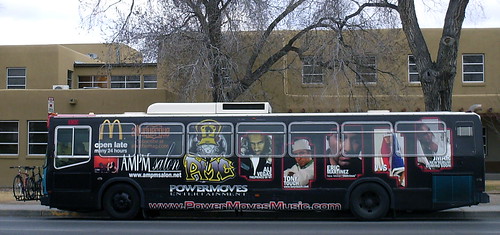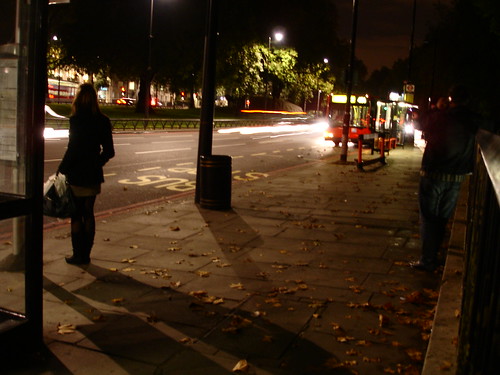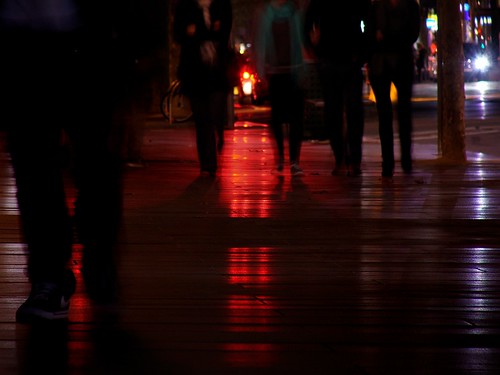I’ve had to work late tonight. I’m hustling up the hill hoping not to miss the six p.m. 50 and already worrying about what time the 11 switches from running every 20 minutes to every hour. I’m relieved to see someone standing at the stop across Yale.
“Has the bus gone by to the airport yet?” I ask.
She hasn’t seen it yet. She says she is an hour late, that the bus runs every 30 minutes, and last night it was here at 5:03, so it should be here at 6:03.
The precision catches my attention.
So does her apprehension. Her voice is tremulous. It’s dark, and light from the streetlamp, some ten feet on the other side of her, is blocked by a huge pine tree close to the sidewalk.
I maintain what I hope is a reassuring distance, and I make small talk about the bus service.
She tells me about an incident on last night’s bus involving an inebriated rider. She says her “partner” worked as a security officer for Sound Transit up in the Seattle area and “she” always came home from work with stories, but this is the first time she herself has ever witnessed an incident.
I’m not sure if she’s out and proud, or if she’s signaling she’s not one of my kind so as to discourage any notions on my part.
I ask why her partner moved to Albuquerque.
The two of them came down from Tacoma together.
Sarah* -- she will tell me her name later -- is a coder working as a contractor for a local HMO. This is her first job since finishing school in Seattle, then an internship in a small town east of the Cascades. She’s just completed two weeks of orientation, and this is her second day of work.
So she’s only been here a few weeks then.
Four, to be exact. After finishing her internship, she went back to Tacoma to try and find work.
“I sent out a thousand résumés, and heard nothing back. Absolutely nothing.”
Meanwhile, her partner had moved from here to Tacoma to join her.
Turns out they met on line.
Sarah says she thinks her partner developed SAD -- “you know, that Seasonal Affective Disorder.” She points out New Mexico gets a whole lot more sunshine than the Pacific Northwest. Yes it does, I tell her.
So when Sarah couldn’t find a job locally, she started looking out here with the idea of getting her partner back home and in a happier frame of mind.
She got a hit from her new employer immediately.
They moved to Albuquerque.
The hardest thing, she adds, was leaving her kids behind.
Whoa, I think to myself, and I ask about her kids.
She has three daughters. This year, the oldest is a senior in college, the middle a senior in high school, and the youngest has just started high school.
Her oldest is pretty much on her own and is getting ready to start a teaching job.
Her middle child is very involved in school and extracurricular projects, and Sarah says she did not want to deprive her daughter of having a senior year which would cap a wonderful high school experience.
“It just wouldn’t be fair to her.”
The parents of a fellow student invited her to stay with them for her senior year.
The youngest has been somewhat of a problem ever since Sarah’s partner came to join her. They didn’t get along.
Sarah’s ex-husband offered to take her in.
Sarah allowed this reluctantly. Her ex-husband, she explains, is bi-polar, and during their marriage attempted suicide several times. But he’s remarried, and seems to be doing much better with his current wife.
His wife reassured Sarah her daughter was welcome in their home.
Her divorce was the beginning of a series of catastrophes that left her homeless for a period of time. (That experience could surely explain her wariness.)
She suffered not one, not two, but three automobile accidents, each of which totaled her car.
She had insurance, but each accident raised her premiums and diminished her reimbursements to the point she could afford neither car nor insurance. That’s when she started taking the bus.
In between accidents, she lost her job.
She says she worked as an accountant for the Port of Seattle for 20 years. The economic collapse dominoed down to local governments who had to downsize. She knew two accounting positions in her department were going to be eliminated, but she was hoping seniority would protect her.
She said they called her in one morning and told her she had done an outstanding job, that the department was a better place for the contributions she had made, and that the Port had saved thousands of dollars because of her. Then they let her go.
She found herself among a lot of newly unemployed accountants looking for work in the Pacific Northwest. When she ran out of funds, she moved herself and her daughters out of their home and to a campground. She set her daughters up in a small camper trailer while she slept in her car.
Her daughters were not happy. Neither was Sarah. But it was all she knew to do.
Although I didn’t get all the details, I heard enough to understand Sarah figured out the bureaucracy for getting various kinds of assistance, and she knows now she was slow to realize what help was out there.
Assistance included medical coverage which, when she first used it, brought her the news she was diabetic.
It also must have included educational aid, because Sarah went back to school to become a coder. She says she was told there was a coming change in the current coding system, and that coders who knew the new coding would soon be in great demand.
She was also happy that, like accounting, coding didn’t require a lot of interaction with people. She tells me she’s not really an extrovert.
I think this is probably true. Even though she’s sharing a remarkable amount of personal history with me, it doesn’t just flow. She answers my questions, but for the most part, she’s leaving me to put the pieces together myself.
So why is she telling me any of this in the first place? I’m guessing she’s been needing to unburden herself, has no one else other than her partner to talk to, and here I am, asking questions and showing interest. The classic stranger in the night.
She finished her coding program with an out-of-town internship.
I’m pretty sure her daughters were back in Tacoma since she doesn’t mention them. What she does mention is that she fell in love with another employee, a woman, who broke off the relationship near the end of her internship.
She loved the job, loved her employer, loved the town. They offered her a permanent job, but she felt unable to stay in such close proximity to the woman she still had feelings for.
“And I would have had medical insurance,” she adds, weighing the loss.
Does she have insurance with her company here, I ask.
No, but she has gotten onto a plan at the University Hospital. On her very first visit, they told her she needed to start taking insulin. Also, she was suffering from altitude sickness. They told her that should pass in a few months after she’s adjusted to living here.
After finishing her internship, she returned to Tacoma. Somewhere between then and now, she met her new partner on line.
Happy ending? Well, not exactly. More like life goes on.
She’s had to start hiding her money from her partner, even though her partner has a job here. And when I say, “You’re kidding!” I see tears start rolling down her cheeks.
“I had to do the same thing with my ex-husband,” she says.
Then she says her partner has promised to start couples counseling in January.
She tells me there’s a Bible verse that says we need to forgive 7,777 times, and she’s started keeping track. The only scriptural calculation for forgiveness I know of is from one of the the Gospels, and that comes to 490. But I keep that to myself.
Just before we reach her stop, she tells me she feels fortunate she met me, and thanks me for showing her the Red Line alternative home. I wish her luck.
Riding on alone, I try to sort out all the strands I’ve heard this evening, but at first, all that comes to mind is the mournful lyric, “Nobody knows the trouble I seen.”
God bless and keep you, Sarah.
__________
*Real name changed.
__________




